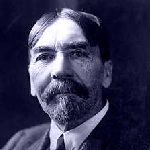Thorstein Bunde Veblen was born Torsten Bunde Veblen on 30
th July 1857 in Cato, Wisconsin, United States, to Norwegian immigrant parents.
Veblen grew up on his parents farm in Nerstrand, Minnesota. This area and others like it were known as little Norways due to the religious and cultural traditions that had been imported from the old country. Although Norwegian was his first language, the young Veblen learned English from neighbours and at school.
His parents put a lot of emphasis on education and hard work and at age seventeen he was sent to study at Carleton College Academy. It was there that he met John Bates Clark (1847–1938) who went on to become a leader in the new field of neoclassical economics. Upon graduating Veblen conducted graduate work under Charles Sanders Pierce (the founder of the pragmatist school in philosophy) at John Hopkins University. He then moved to Yale in 1884 to take a Ph.D. and completed his dissertation on “Ethical Grounds of a Doctrine of Retribution.”
Upon leaving Yale he was unable to find a employment. This was partly due to prejudice against Norwegians, and partly because most universities considered him insufficiently educated in Christianity; most academics at the time held divinity degrees. Due to this, Veblen returned to the family farm – ostensibly to recover from malaria – and spent six years there reading voraciously. However, in 1891 he was accepted to study economics as a graduate student at Cornell University. From here on his academic career took off, obtaining his first professional appointment at the University of Chicago – where in 1900 he was promoted to assistant professor – and from there moving on work at institutions including Stanford University and the University of Missouri.
Veblen drew from the work of 19
th century intellectuals such as Charles Darwin and Herbert Spencer to develop a 20
th century theory of evolutionary economics. He described economic behaviour as socially determined and saw economic organization as a process of ongoing evolution. In his work
The Theory of the Leisure Class (1899) he outlined how rich and poor alike, attempt to impress others and seek to gain advantage through what Veblen coined “conspicuous consumption” and the ability to engage in “conspicuous leisure.” In
The Theory of Business Enterprise (1904) he used evolutionary analysis to explain the growth of business combinations and trusts.
In the 21
st century his ideas have come back into the spotlight as a valid approach for studying the intricacies of economic systems and his theory that humans do not rationally pursue value and utility is one of the cornerstones of the modern discipline of behavioural economics. Veblen made a lasting contribution to his field and has influenced many scholars that have followed him.


